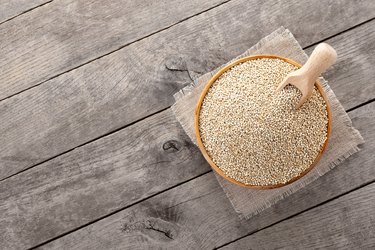
Quinoa has undoubtedly earned its title as one of the top grains of choice if you're trying to eat healthier, thanks in part to the grain's low fat and high protein content. Bulgur, on the hand, is a relative newcomer to the healthy eating scene despite being a staple in Middle Eastern cuisine.
A staple ingredient in most Middle Eastern homes, bulgur is commonly used in everything from loaves of bread and stews to sides and salads, including tabbouleh where its nutty flavor pairs well with the rest of the salad's fresh ingredients.
Video of the Day
Video of the Day
Quinoa, which is often incorrectly categorized as a grain, is actually a seed belonging to the Chenopodium quinoa plant species. Though white quinoa is the variety that is most commonly found on grocery store shelves, it is also available in other colors, including red and black.
Nutrition of Bulgur and Quinoa
There are 222 calories in one cup (185 grams) of cooked quinoa. Bulgur, on the other hand, is lower in calories with a cup of the cooked grain containing just 151 calories. A major difference in nutrition between bulgur and quinoa is in its fat content. Bulgur is very low in fat, with one cup containing only 0.44 grams compared to 3.55 grams of fat in a cup of cooked quinoa.
Read more: Quinoa and Weight Loss
It also has a lesser amount of protein, with one cup of bulgur containing only 5.2 grams of protein. A cup of cooked quinoa contains 8.14 grams of protein, thanks in part to its high lysine content, an essential amino acid required by the body in order to properly function. Bulgur, however, is higher in fiber, containing 8.2 grams of total dietary fiber in one cup of cooked grain, whereas quinoa only offers 5.2 grams of dietary fiber per cup of cooked seed.
Benefits of Quinoa
According to Purdue University, quinoa is native to Bolivia, Chile and Peru, where it's grown in high altitudes up in the Andes Mountains. While it has only just gained popularity in the United States in the last few years, quinoa was always considered a staple food to the ancient Incas, who have been growing and cultivating the tiny seed for centuries.
Read more: Rare Bodily Reactions to Eating Quinoa
Quinoa is high in minerals like calcium, magnesium and phosphorous. According to MedlinePlus, it is also rich in potassium, a mineral that the body requires in order to maintain a regular heartbeat and build muscles. The vitamins found in cooked quinoa include carotene and vitamin E, as well as folate. The Centers for Disease Control and Prevention shares that the body requires these vitamins to produce new hair and skin cells.
Cooked quinoa also contains trace amounts of thiamin, tocopherol, niacin and vitamin B6, which are necessary for metabolism and the release of cellular energy, as well as all the essential amino acids the body requires to properly function.
Benefits of Bulgur
The University of Illinois Extension explains that bulgur is a pre-cooked and dried whole grain originally made from wheat. And, according to the United States Agency for International Development, a vegetarian meal that's high in protein can be easily made by combining bulgur with chickpeas and other pulses.
Cooked bulgur includes minerals like calcium, zinc, magnesium, phosphorous and potassium, as well as vitamins like thiamin, riboflavin, niacin and vitamin B6. Bulgur is also a good source for manganese, a mineral which helps prevent the development of osteoporosis and osteoarthritis.
One cup of bulgur contributes 48 percent of your daily value. It's important, however, to note that most of the minerals and vitamins in bulgur occur in trace amounts. So unless you consume large quantities of bulgur, it won't make a dent in your daily vitamin and mineral intake.
However, there are a number of benefits of adding bulgur to your diet. A cup of cooked bulgur is lower in calories when compared to a cup of quinoa. It also has a lower fat content, provides trace amounts of vitamins and minerals, and when compared to quinoa, bulgur has a higher amount of dietary fiber. This makes it a good choice of grain for people looking to regulate their bowel movements and increase their levels of satiety.
- University of Florida IFAS Extension: "Facts About Quinoa"
- Purdue University: "Quinoa"
- USDA National Nutrient Database: "Bulgur, Cooked"
- USDA National Nutrient Database: "Quinoa, Cooked"
- University of Illinois Extension: "Bulgur Wheat: A Quick-Cooking, (and Delicious!) Whole Grain"
- USAID: "Bulgur Commodity Fact Sheet"
- MyFoodData: "Nutrition Facts for Cooked Bulgur"
- MedlinePlus: "Manganese"
- Centers for Disease Control and Prevention: "Folic Acid"
- MedlinePlus: "Healthy Food Trends — Quinoa"